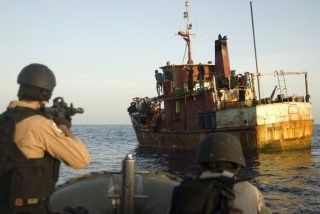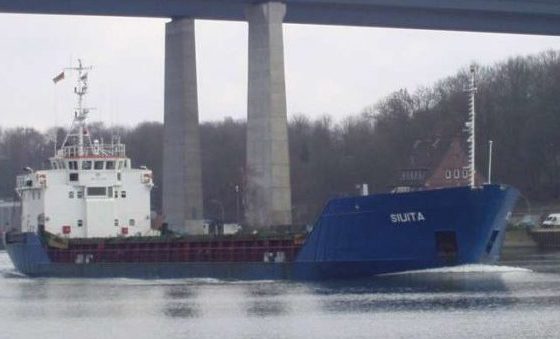Piracy Attacks off East Africa Doubled in 2017
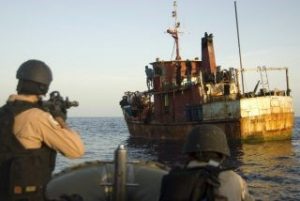
Illustration; Image Courtesy: US Navy
The number of piracy incidents doubled off the coast of East Africa in 2017 compared to 2016, according to the annual State of Piracy report released today by One Earth Future’s (OEF) Oceans Beyond Piracy program.
The report analyzes the human and economic impacts of maritime piracy and robbery at sea in the Western Indian Ocean Region, the Gulf of Guinea, Asia, and Latin America and the Caribbean.
“Pirate activity in 2017 clearly demonstrates that pirate groups retain their ability to organize and implement attacks against ships transiting the region,” says Maisie Pigeon, the report’s lead author.
Incidents in this maritime space have posed an additional threat to shipping transiting the Gulf of Aden and the Red Sea.
“There is now a wide range of threats to shipping near the Horn of Africa that have been complicated by the conflict and instability in Yemen,” says Phil Belcher, Marine Director of Intertanko.
“We are advising our members to consider a more comprehensive security assessment to take into account other threats beyond traditional piracy emanating from the regional conflict in Yemen.”
The report shows that there were 54 incidents in 2017 in the region, out of which four were successful hijackings. These included Aris 13 bunkering tanker, the first vessel to be hijacked in the region in the last 5 years, Asayr 2, Al Kausar and one dhow. The report also indicated that there were 15 failed hijacking attacks.
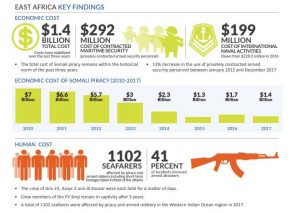
Piracy and armed robbery in the Gulf of Guinea continue at persistently high levels. In 2017, 1,726 seafarers were impacted in a total of 97 incidents, despite the increased efforts of regional states and contracted maritime security providers.
The report shows a USD 13.2 million increase in spending by regional states on law enforcement and naval patrols, and a continued proliferation of contracted maritime security schemes. A South Korean vessel Munmu the Great was re-deployed to the Gulf of Guinea in response to the kidnapping of 3 South Korean fishermen in March.
“Kidnap-for-ransom continues to plague the region, which is a trend that has unfortunately continued from 2016,” says Pigeon. The report found that 100 crew members were taken hostage in 2016. There were 21 kidnapping incidents in 2017 and only one hijacking for cargo theft, based on the report.
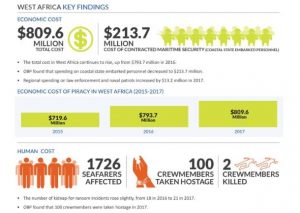
Maritime crime in Latin America and the Caribbean is also on the rise. Yachts were the primary target of these attacks, 42 of them involved in incidents in 2017. A total of 854 seafarers were impacted in 71 incidents, up considerably from 27 reported in 2016.
Majority of these robberies conducted while the vessels were at anchor, with only 23 percent being armed attacks.
“We have observed a significant increase in violent incidents and anchorage crime, particularly in the anchorages of Venezuela and the recent violent incidents off Suriname in the first part of this year,” says Pigeon.
The piracy situation in Asia improved considerably in 2017, with overall incidents down by over 20 pct from 2016. Most encouraging was that kidnap-for-ransom attacks decreased from 22 in 2016 to just 4 in 2017.
However, 16 crewmembers did get kidnapped in 2017 and 17 seafarers were killed in incidents that took place in 2017 in the region. This is subsequently down when compared year-on-year as 63 seafarers were taken hostage in 2016.
The longest duration of captivity was 264 days and the shortest 4 days.
In total, 1908 seafarers were affected by pirate attacks in Asia, down from 2,283 in 2016.
“We believe that much of the credit for this progress is due to the trilateral patrols between the Philippines, Malaysia, and Indonesia,” says Gregory Clough, Ocean Beyond Piracy’s acting director.
Having assessed the state of global piracy and armed robbery dating back to 2011, OEF has concluded that piracy and other crimes cannot be comprehensively addressed unless the maritime community begins to address the broader issues that create insecurity at sea. These include combatting illegal fishing in the area as well as curbing maritime pollution.
“Piracy is just one issue in a complex web affecting maritime security,” says Larry Sampler, OEF’s president. “Where there is good governance seas are safer, coastal communities are healthier, and the blue economies grow stronger. OEF is committed to promoting global maritime security.”

